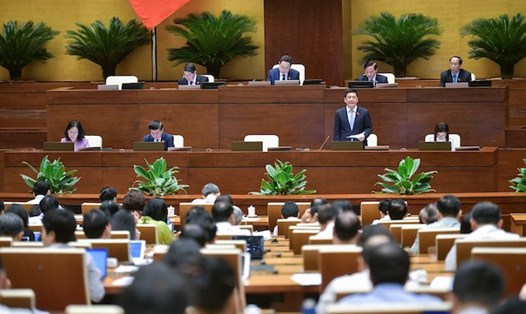As the year comes to an end, the demand for import and export of goods by businesses is increasing. The increase in the USD exchange rate has divided the world into two halves, some laughing, some crying as the USD price ladder fluctuates strongly.
Import-export businesses face the "problem" of rising USD prices
In theory, the increase in the USD exchange rate will benefit export enterprises. These enterprises will benefit from cheaper Vietnamese goods in the international market. At the same time, the costs that export enterprises pay for workers in Vietnam are lower, so profits will continue to increase.
However, if the cost of importing raw materials to produce goods increases, the benefit from the exchange rate will be limited.
Although it is an export enterprise, Lenger Vietnam Seafoods - one of the prestigious seafood corporations in Europe with more than 90 years of experience in farming, catching and processing bivalve mollusks, also faces difficulties when the exchange rate fluctuates.
The upside of the USD exchange rate increase is that it earns more local currency. On the other hand, exporting manufacturers have to pay more for imported auxiliary materials such as product packaging or sea freight, which also increases volatility. "In many cases, the high deficit affects the benefits of exporting enterprises," said Mr. Nguyen Ho Nguyen - General Director of Lenger Vietnam Seafood Company.
Mr. Nguyen's company understands and accepts the fluctuations of the exchange rate, and from there has the most beneficial adjustment solutions. "However, we hope that the State will regulate so that the exchange rate does not fluctuate much, it is best to stabilize the exchange rate for a long enough period of time," Mr. Nguyen added.
For export enterprises such as Thuy Anh Fruits - an imported fruit system, the representative of this unit said: "The increase in USD/VND exchange rate contributes to increasing costs, leading to products becoming less attractive when sold.
Not to mention the increase in input costs, but the output remains the same, or worse, affecting profits, or even making no profit at all. Therefore, many businesses consider not importing anymore."
Peace of mind with the State Bank's exchange rate coordination
Dr. Chau Dinh Linh (Lecturer of the Faculty of Business Administration, Banking University of Ho Chi Minh City) said that the sharp increase in the USD in the world has affected all countries, not just Vietnam. If the exchange rate increases rapidly, without the "intervention" of the State Bank, it will lead to negative effects.
Currently, the State Bank is operating the exchange rate flexibly based on the central rate with a +/- margin of 5%, so the fluctuation of foreign exchange rates is more "breathable". "The worst-case scenarios have been proposed by the State Bank to ensure interest and principal, so import-export enterprises can rest assured," Mr. Linh emphasized.
If it cannot intervene with tools such as open market operations, coordinating supply and demand for liquidity in the interbank market, the State Bank will directly intervene in the foreign exchange market to ensure the exchange rate between VND and USD.
Dr. Linh said that the Vietnamese market depends heavily on the USD, from imports, loans to supply and demand differences. This great dependence requires adjustments to stabilize the exchange rate. This will help the VND exchange rate stay in the "safe" zone.
The State Bank's flexible management policy aims to eliminate negative factors affecting the Vietnamese market.
The negative impacts on businesses that import from other countries will be clearly shown because they are pegged to the USD, so when the exchange rate increases, input costs will increase accordingly. "However, the Vietnamese market is following the trend of trade surplus, so if there is any import of input materials, it is also to create liquidity for export, thereby, the negative factors are gradually reduced," said Dr. Chau Dinh Linh.
Experts affirmed that although the increase in USD exchange rate has caused a lot of pressure, the flexible policy of the State Bank is showing balance, creating stability for VND, so import and export activities are taking place relatively smoothly, attracting many opportunities in the market.











